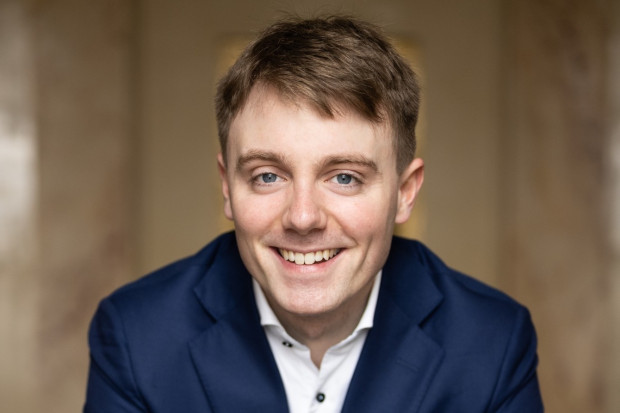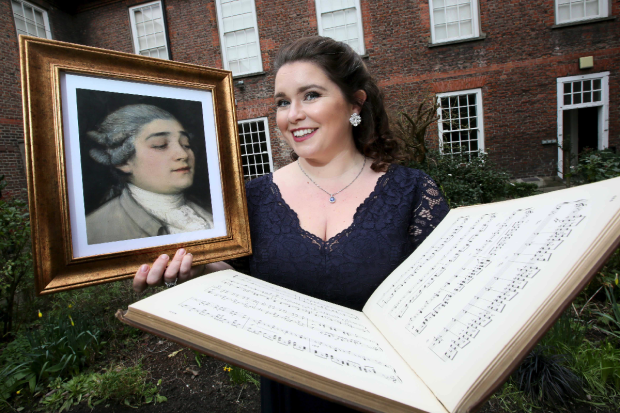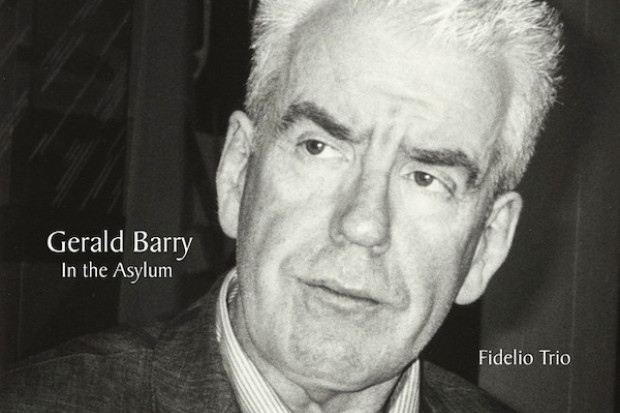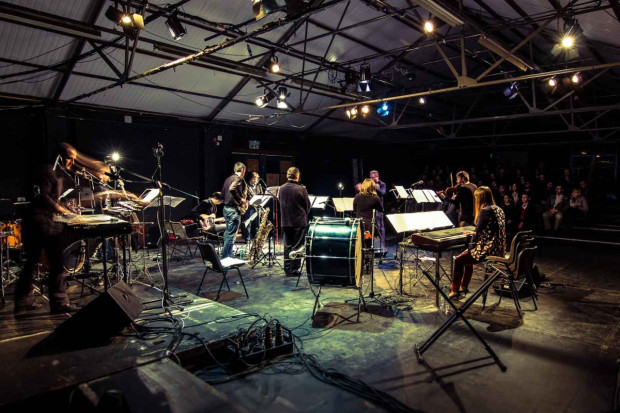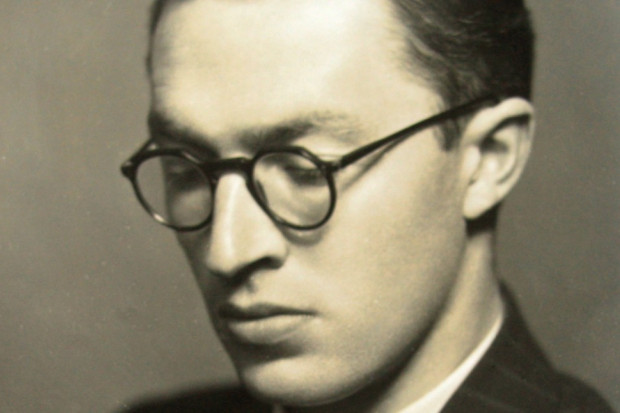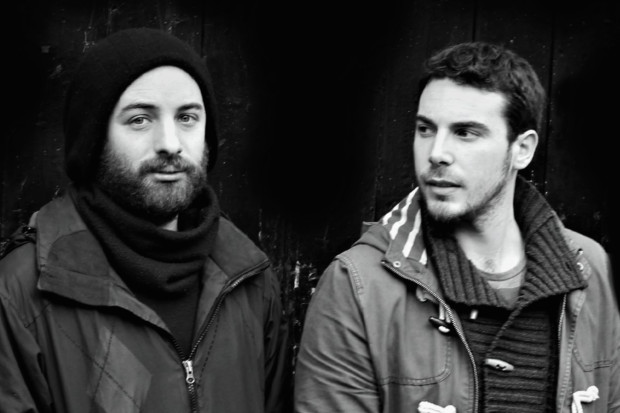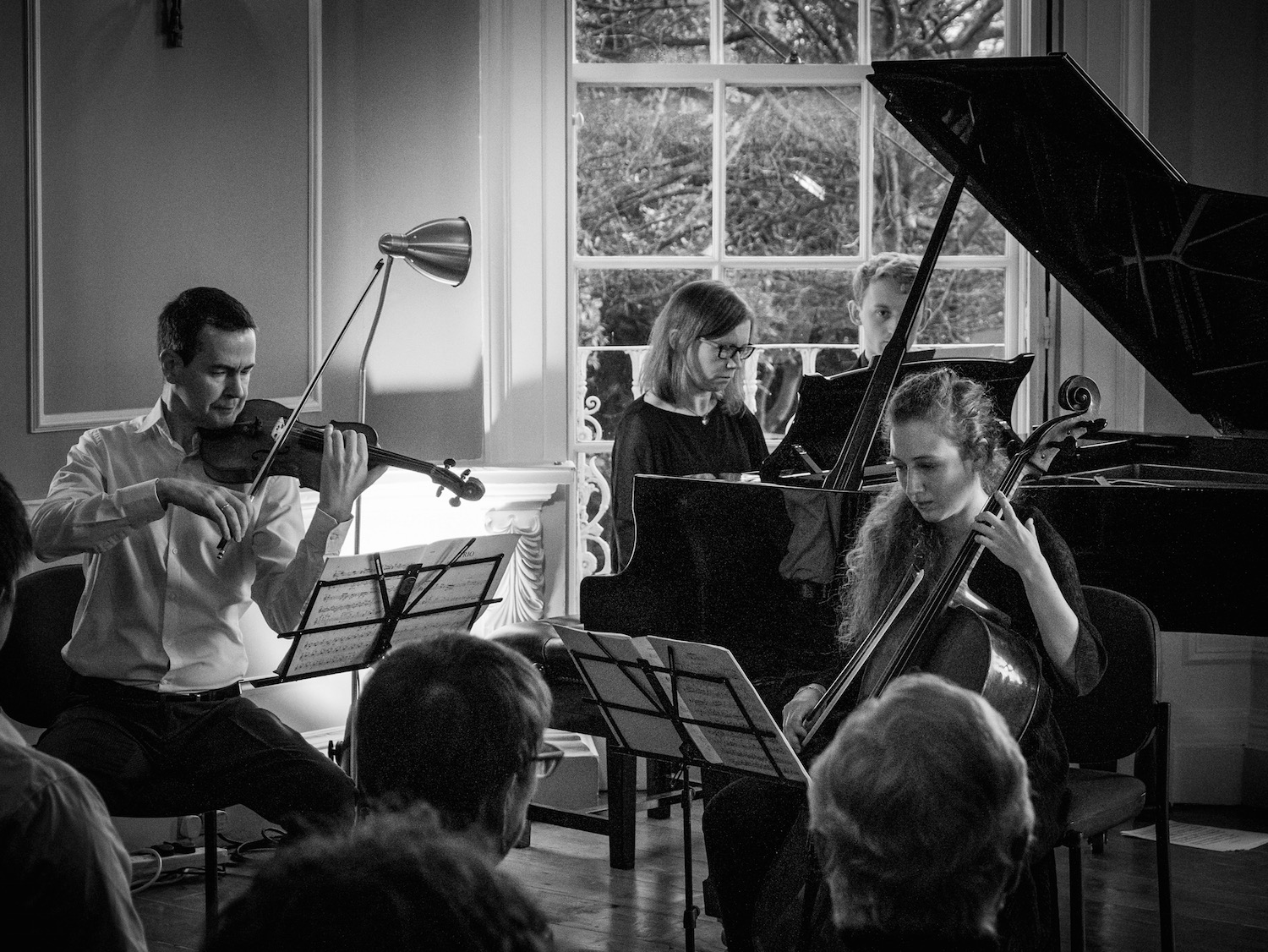
The Fidelio Trio at Belvedere House (Photo: Pavel Urusov)
Miracle in Drumcondra
The Fidelio Trio’s annual Winter Chamber Music Festival is one of the hidden gems in the Irish music calendar. Now in its seventh year, the festival takes place in the beautiful drawing room of Belvedere House, located on DCU’s St Patrick’s Campus in Drumcondra (29 Nov.–1 Dec.). This room is perfect for chamber music both acoustically and in terms of atmosphere, and it’s also quite small meaning that there is a real sense of intimate connection between the performers and the audience. This year the Fidelio Trio were joined by their friends from the Apple Hill String Quartet based in New Hampshire who participated with them in the concerts on Saturday and Sunday.
The festival began on Friday evening with a concert of piano trios by Arensky, Rachmaninov and the Irish premiere of a trio by Xiaogang Ye, one of China’s most preeminent composers who the Fidelio had performed back in May at the Beijing Modern Music Festival. Unfortunately, due to reviewing commitments elsewhere, I couldn’t attend this performance but I did make it in for the rest of the festival which continued the following evening with two concerts at 6pm and 8pm. The first of these, again by the Fidelio, featured another host of piano trios by E. J. Moeran, Rebecca Clarke and a world premiere by Belfast composer Brian Irvine.
Moeran and Irvine
The constant swinging between a lush romanticism and a more reflective English pastoralism that characterises Moeran’s trio makes it a difficult one to pace as the near constant sense of rapture can become overbearing. However, the Fidelio Trio not only managed to find the necessary range in their performance but also the necessary colour. A particularly special moment was cellist Adi Tal’s opening to the second movement that sounded almost ghostly at first – without vibrato and bowing near the bridge – but which was then sweetening into a rich, warm Romantic tone as soon as the piano entered.
Listening to Brian Irvine during his pre-concert talk you could be forgiven for thinking that here is a composer who makes it all up as he goes along. While his piano trio A history of Love I – V displays too much evidence of careful planning for this ever to be the case, his music does have a sense of ‘play’ about it that is absorbing. Even more interesting are the moments when the music changes tack and embarks on something more serious. The opening movement is a case in point. It begins with material that sounds like a rhapsodic gesture extracted from the Moeran trio except that all the notes have been moved around arbitrarily in a kind of mock parody. However, within seconds the music hits the brakes and stops dead on a gently dissonant sonority that is allowed to resonate before the manic activity resumes. Moments like these ensured the listener was kept on edge and the piece managed to traverse a considerable range; even in its quieter moments, such as the third movement, the music could oscillate from an icy coldness – high-pitched harmonics on violin and cellos – to an almost elegiac lyricism as the music kept on returning to a C major triad in the middle register of the piano. Of its five movements, the most gripping for me was the fourth, where a mechanical ostinato – an alternating fourth in unison by the piano and violin – was progressively scribbled upon by the cello and destabilised by the interjection of left hand chords on the piano. When this construct fell apart the music became at times mock classical and at other times innocently tender with the violin and cello dueting over harmonic droplets on the piano.
The concert finished with a piano trio by Rebecca Clarke whose work is currently undergoing a revival as part of the more widespread interest in female composers. This work has some wonderfully striking textures but it tends to over-rely on the short ‘motto-theme’ heard from the outset. This was developed quite effectively in the first movement but when it insisted on appearing in successive movements, it began to feel like a kind of comic bogeyman that the music can’t seem to free itself from. It came across as a heavy-handed attempt to achieve some sort of unity and actually sounded quite unsubtle and distracted from the other sections of great originality.
Blistering Apple Hill
The later gig at 8pm featured the Apple Hill Quartet who gave outstanding performances of Mozart’s String Quartet No. 18 in A Major and Mendelssohn’s String Quartet Op. 44 No. 1 in D Major. The coordination of phrasing and the pacing of the movements in the Mozart was such that the music seemed to grow effortlessly in intensity across the four movements culminating with a wonderfully dramatic interpretation of the development section in the finale. If this was simply a joy to listen to, it was exceeded by a truly blistering performance of the Mendelssohn quartet that followed. To hear such committed playing in such an intimate setting was a deeply moving experience.
After the interval, violinist Darragh Morgan and pianist Mary Dullea of the Fidelio Trio joined the Apple Hill Quartet for a performance of Ernest Chausson’s Concerto for Violin, Piano and String Quartet. Although the first movement of this work is a fairly academic exercise in trying to expand a three-note motive in the style of Cesar Franck, the performers did manage to squeeze every expressive drop out of the music, and, in the less inhibited movements that followed, this generated some magical moments. Morgan’s wonderfully expressive playing of the violin solo part in the haunting third movement was a particular highlight.
Traditional and modern
The final concert in the festival took place at 3pm on Sunday and opened with Schumann’s Three Romances for piano and cello performed with great musicality by Dullea and Tal. The centerpiece of this concert was another world premiere of a piano trio, this time by Louis Karchin. In the programme note, Karchin wrote that with this piece he wanted to revive some traditional music forms but also to write something ‘modern’. However, Karchin’s conception of ‘modern’ seemed to me to be more than a little past its sell-by date with pithy, fragmentary textures and quirky irregular rhythmic figures combined with ecstatic expressionistic outbursts overusing the upper range of the violin. Unlike, Irvine’s piece the previous evening which managed to maintain a critical distance from such gestures or else infuse them with a sense of mischievousness, Karchin’s piece remained deadly serious throughout which lessened the extent to which one was willing to accept these gestures at face value.
The festival closed with Schumann’s Piano Quintet in E-flat Major, a work that is the cornerstone of the piano quintet genre. For this performance, the Fidelio Trio were augmented by Elise Kuder on first violin and Mike Kelley on viola from the Apple Hill Quartet. While the performance showed no let up in energy and concentration, from the scherzo onwards it had that exuberance that only comes from musicians not only playing well but also enjoying themselves and, as such, it marked the perfect end to the festival.
The staff in the music department at DCU, GlasDrum arts organisation and the Fidelio have to be commended for directing yet another outstanding festival which continues to be a model of good programming – mixing new work and rarely heard pieces with well-known staples of the repertoire. The festival this year managed to receive a good crowd with a healthy turnover between each concert though a few intrepid punters did stay for everything. However, such is the consistently high quality of the performances that it’s a miracle the festival isn’t sold out months in advance with a queue out the door of Belvedere House looking for standby tickets. Perhaps chamber music fans will continue to remain reluctant to traipse out to Drumcondra – just a mile from the centre of Dublin City – but in any case I’ll be buying my tickets earlier next year just to be on the safe side.
Visit www.fideliotrio.com.
Published on 4 December 2019
Adrian Smith is Lecturer in Musicology at TU Dublin Conservatoire.












